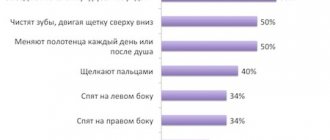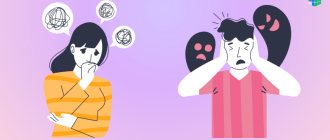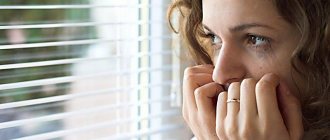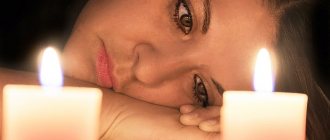Consultation via Skype or WhatsApp is available.
Fear of death is a natural reaction of the psyche, which underlies self-preservation. This feeling is inherent in absolutely all living beings. We value life because we understand that we are mortal. It is the fear of dying that makes a person more attentive and careful. This avoids taking unreasonable risks.
But sometimes this feeling becomes so strong that it does not help, but hinders life. In this case, it is customary to talk about a pathological condition - thanatophobia. It is based on a panicky fear of death, which arises for no reason, mainly at a young age.
A person is tormented by obsessive thoughts about inevitable death. He stops going outside because it is dangerous there. Any discomfort in the body is perceived as a symptom of a serious illness. Mentions of funerals, cemeteries, and ghosts lead to a panic attack. The meaning of life is lost, which leads to loneliness and the development of depression.
Fear of death also occurs in people who suffer from panic attacks or neuroses. This condition requires treatment from a psychotherapist or psychiatrist.
Symptoms
Manifestations of the disorder vary from person to person. In most cases, an avoidant anxious behavior style is formed. If a person is afraid of dying from an illness, then trips to hospitals and constant examinations are typical. If fear is associated with an accident, then isolation and avoidance of public places occurs.
Symptoms of panic attacks and fear of death involve physical manifestations that occur suddenly. These include:
- trembling throughout the body;
- palpitations - a feeling that your heart will jump out of your chest;
- lack of air;
- increased sweating;
- chills or intense hot flash;
- sharp pain and heaviness in the chest;
- numbness of the limbs;
- dizziness;
- darkening of the eyes.
All these manifestations occur simultaneously, without an obvious external cause. This condition is scary. Often such an attack is mistaken for a heart attack or as a manifestation of another fatal disease. A person perhaps realizes for the first time that he can die at any moment. This fear consumes all his thoughts, which negatively affects his personal and professional life.
In people with a panicky fear of death, symptoms affect more than just the body. Behavior, habits, and attitude to life change. The following manifestations are characteristic:
- aggressiveness or irritability;
- increased anxiety;
- desire for loneliness;
- avoiding any situations that may involve risk;
- excessive sensitivity;
- passivity;
- conversations about the meaninglessness of current events;
- diffidence.
A person at the initial stage of development of a phobia realizes that there are no real reasons for panic. He tries to cope with the feeling of fear on his own. But life in constant tension also leads to gastrointestinal disorders, sleep disorders, and arterial crises.
I have frequent attacks of fear and obsessive thoughts that I am going crazy. I'm afraid I'll become schizophrenic
The first attack of a panic attack this year occurred on the road, when we were going on vacation to our parents, it was so overwhelming that I thought I was going to die, we stopped to rest in a hotel, it went away, we got there normally, there were no more attacks that strong. The vacation was over, we left the children with my mother, the eldest daughter went to college, the youngest was sent to school, we returned to the north ourselves to finish our husband’s affairs, or rather wait for his dismissal (he is a military man), pack up things and finally move to the children and start a new life. When we left, it was very hard on my soul that I was leaving the children, I didn’t want to go north at all. We arrived there, my mood was depressed, I was constantly crying, my husband’s work seemed to be resolved, but very slowly and something was always wrong, which delayed our departure. One day we decided to drink beer, the next day I had a panic attack, I thought I was dying and I wouldn’t leave anywhere from this north, after that moment thoughts about death, the fear of going crazy began almost every day, my head was spinning, walking with the dog, passing a short distance, I began to think that suddenly it would become bad and I would fall, so I ran home. Remembering about the pills, I decided to order them at the pharmacy, bought them, the day of departure from the north was finally approaching, and so that God forbid I got sick on the road, I started taking them, it seemed to be easier, it seemed like I should be happy and forget about it all, but it was about 4 days ago, we went to the village for a day off, and for no reason at all, the feeling that I was going to die came again, we arrived in the city, I burst into tears from powerlessness, that nothing was going away and that nothing was helping. The next day everything was fine, I got distracted, practically spent the whole day doing renovations, and yesterday we went back to the apartment where we were doing renovations, I started opening a box of dishes, took a knife, and suddenly the thought flashed through, what if I could do something for myself, Looking at my husband, I thought that suddenly I could harm him, I was so overcome that I began to shake and immediately in my head that I was going crazy, I probably have schizophrenia, like that grandmother who has been out of her mind for 36 years. I went into the room, burst into tears, my husband took me to my mother’s apartment, while I went up to the 3rd floor, my head was spinning, I ran into the apartment and there was hysteria, tears that I couldn’t do this anymore, my children began to support me, it seemed to let me go a little, but The thoughts that I fell ill with schizophrenia still do not leave me. Reading the symptoms, I am beginning to be convinced of this. Is this really true?
The first panic attacks happened to me in 2022, at that time I didn’t know that it was PA, my blood pressure was jumping, my mouth was dry, it was difficult to swallow, my pulse was over 100, I had everything examined, and an MRI of the brain and neck, ultrasound of blood vessels, ultrasound hearts, a holter was hung, tests for hormones, ultrasound of the thyroid gland - everything is normal, except for cervical osteochondrosis. In the north, no one helped, I came to my mother, went to a neurologist, she listened and said that it was PA, prescribed Paxil, Strezam, Magnerot, I ordered books by Pavel Fedorenko, started taking pills and reading, even at night with a flashlight in my hand, and I It helped, then I gradually came off the pills and there was no PA, and there were no thoughts of death or madness. And for now, this is how it is.
Where does the fear of death come from?
From a physiological point of view, the occurrence of fear of death during panic attacks is quite understandable. Against the backdrop of constant stress, a large dose of adrenaline is suddenly released into the body. This is the so-called fear hormone, which helps a person escape in an extreme situation. Because of this, the heart and all organs in the body work at an accelerated rate.
The above symptoms occur - palpitations, pressure surges, hot flashes, etc. Saturation of blood with oxygen due to frequent breathing leads to dizziness and nausea. Often a person does not understand what is happening to him during a panic attack. The simplest explanation for the sudden deterioration in health is: I’m dying.
The development of thanatophobia is based on hidden factors associated with religious beliefs, childhood trauma, physical or mental fatigue.
Reasons also include:
- A real brush with death for sensitive people can lead to the development of a phobia.
- Fear of losing control. Panic attacks cannot be controlled.
- The unknown of what awaits after death.
- Middle age crisis.
- Making a serious diagnosis.
The important point is that in order to develop a panicky fear of death, a person must have individual prerequisites. Typically, this disorder affects excitable, anxious people who are prone to excessive worry and worry.
Often the phobia develops against the background of a complicated pregnancy. Having experienced a miscarriage or almost losing a child in childbirth, the woman will subsequently overprotect her son/daughter. Parental concern is a normal and natural reaction. But when the fears of adults prevent a child from living and developing fully, we can talk about the development of pathology.
If you suffer from panic attacks, fear of death - how to deal with these conditions? No way on your own. Only a qualified, experienced doctor can help.
Fear of ticks - Acarophobia
June 12, 2022
The onset of spring means clear and warm weather, barbecue in nature and walks in the forest and park. Also in the spring, ticks become more active. Ticks are small arachnids that live in the soil; their period of activity occurs when the earth warms up to +5 degrees.
And for some people the arrival of spring becomes a real nightmare. They are afraid of ticks, their appearance, appearance, bite, complications, scabies. These people are acarophobes.
Acarophobia is a panicky fear of mites and scabies. This is a pronounced fear of scabies, which occurs in those who, for some reason, are sure that they are infected with a scabies mite.
Causes of fear of ticks:
- History of scabies. A person who has had scabies once is terribly afraid of it happening again. The terrible itching and dermatitis and debilitating treatment immediately come to mind.
- Illness of a loved one . Perhaps the person observed the illness of a loved one. This impressed him and was deposited in the depths of his subconscious. When a person sees a scabies mite, he remembers an old picture of scabies.
- Disgust . A person with excessive cleanliness experiences disgust at the sight of small blood-sucking creatures. This is either a personal characteristic of a person, or a dislike of unsanitary conditions.
- Fear of encephalitis . After listening to the news and reading the press, a person becomes frightened even by the sight of a tick, especially its bite and potential infection with encephalitis.
- History of allergies. People suffering from allergic reactions are afraid of a tick bite due to the possibility of exacerbation of allergic manifestations.
- Other diseases . Fear of ticks can develop against the background of head injuries, intoxication, and somatic diseases.
Acrophobia is rare these days. But most often the fear of ticks manifests itself in women after 50 years of age. In men, young people are more often affected.
Symptoms of fear of ticks:
- Fear of encountering ticks.
- Constant treatment of skin and clothing with chemicals.
- Fear of walks in the forest.
- Regular inspection of skin and things.
- Studying medical literature about diseases transmitted from tick bites.
- Panic attack when encountering a tick. It seems to a person that there are many ticks crawling on him, and itching occurs.
- Severe itching at the sight of any small insect.
- A feeling of imminent death after a tick bite.
- Being in constant tension, perhaps there are ticks sitting behind a tree or on a bush in the park.
- The desire to destroy an insect.
- Physiological manifestations: dizziness, rapid heartbeat, general weakness, confusion, disorientation, panic. Maybe vomiting, diarrhea.
For some, symptoms appear at the sight of ticks, for other people, fear and anxiety are constant, while others feel sick at the mere mention of ticks.
It is possible that all symptoms do not appear in the patient at once. They may change as fear develops. In a state of stress, symptoms will intensify and become more pronounced. It will be difficult for the patient to communicate and lead a normal lifestyle. In severe cases, he will completely abandon social life.
Self-help:
- Ask yourself questions and answer them. If the answer is negative, find a positive one.
- Why do I panic when I see ticks?
- What happens if I look at a tick?
- What will happen if I am not afraid of them?
- Why did I decide that a tick would bite me?
- Understand whether your fear is really due to a threat to life.
- Speak out the fear. How often do you see ticks in your life?
- Take a look at yourself . Is it comfortable to live with such a habit?
- Do breathing exercises, establish proper nutrition, walk, smile.
Treatment of the disease:
The psychotherapist determines in the process of communication with the client the characteristics of the course of the phobia and differentiates acarophobia from other fears.
- Cognitive behavioral therapy. Generally recognized effective method. The specialist helps you create a list of fears, from least to most frightening. The fearful moment is discussed and new behavior is worked out.
- Hypnosis. The psychotherapist inspires the patient to change negative attitudes to positive ones, teaches self-regulation and visualization techniques.
- Drug treatment (sedatives).
- Neurolinguistic programming. It is not a generally accepted method of psychotherapy. The therapist examines present events, not past ones. The specialist is looking for internal resources to change attitudes towards ticks.
- Technique of gradual rapprochement.
- Art therapy.
- Autogenic training.
Every person has many fears that you just need to accept and take advantage of them. But if you feel any problem, you need to immediately contact a specialist to improve your prognosis and quality of life.
Psychologist, analytical psychotherapist Andrey Aleksandrovich Filippov will provide qualified assistance in solving this problem.
Don't be left alone with your fear!
Treatment options
The symptoms of this disorder are similar to other phobic anxiety disorders. For example, sometimes neurosis or depression can be accompanied by a panicky fear of death, how to treat and who to contact in this case?
To differentiate between conditions and make a correct diagnosis, you need to consult a psychiatrist. It is recommended that you first undergo a comprehensive full examination by general practitioners. This will help eliminate diseases of the internal organs that can cause thanatophobia.
You need to know that treating any disease takes time. Panic attacks with phobic manifestations are a complex disorder. Treatment is selected individually. For this we use:
Pharmacotherapy
Sedatives and anti-anxiety medications reduce symptoms. Allows you to reduce anxiety and normalize sleep. Medicines are used only when necessary.
Psychotherapeutic methods.
To find out how to get rid of the panic fear of death, you must finally identify the true underlying causes of this condition. For this purpose, hypnotic techniques, cognitive behavioral therapy, and individual conversations with a doctor are used.
The therapy is based on a lot of internal work, which helps to understand and work through internal conflicts and hidden mental traumas.
Many people are concerned about the question: how to overcome the fear of death during panic attacks on your own? This is possible if a person has the skills of relaxation and relaxation. In such a situation, breathing exercises can help quickly reduce panic. This is also taught in group or individual psychotherapy sessions.
Death is inevitable, and therefore it is important to love and appreciate life. If fear, panic and despair do not allow you to enjoy every day, then do not delay visiting a psychotherapist.
What is nosophobia
Nosophobia is a long-term, exhausting, inexplicable fear of contracting a specific disease (less often several diseases). If caring about one’s own health and not wanting to get sick is the norm, then with nosophobia this natural state turns into the status of a disease, since it occupies all a person’s thoughts and deprives him of the joys of life.
Depending on which disease causes the patient’s concerns, the following variants of nosophobia are distinguished:
- Cardiophobia - fear of heart disease. Options: heart attack phobia - fear of having a heart attack, anginophobia - fear of angina attacks;
- cancerophobia - fear of getting cancer;
- Diabetophobia - fear of getting diabetes;
- speedophobia - fear of getting AIDS;
- dementophobia or lissophobia - fear of dementia or madness;
- Scotomaphobia - fear of going blind;
- syphilophobia - fear of contracting syphilis.
There are also “exotic” fears, such as the fear of a runny nose (epistaxiophobia) or the fear of getting hemorrhoids (proctophobia). Cardiophobia and cancerophobia are perhaps the most common disorders in this group.
Sometimes nosophobia is confused with hypochondria. These are very similar concepts, but if hypochondria is an anxiety disorder based on suspicion of various diseases, then nosophobia has a pronounced phobic component - the presence of panic attacks makes the course of nosophobia more severe. Also, a hypochondriac usually suspects that he has all the diseases at once, and may begin to look for a disease that he read about on the Internet or overheard in the clinic. A nosophobe usually has one (less often several) reasons for fear, and other diseases do not bother him much.










